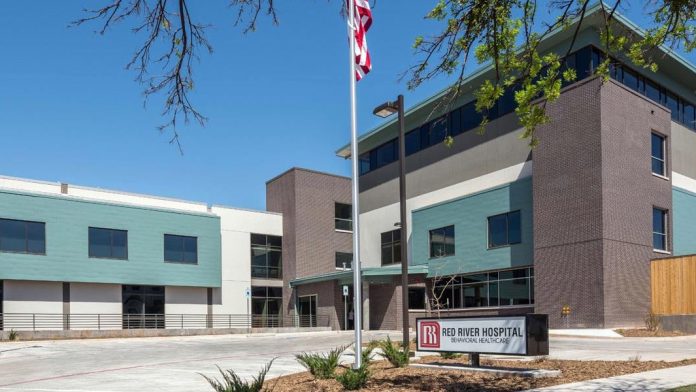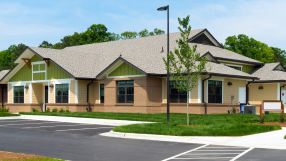Red River Hospital
1505 8th Street
Wichita Falls, TX 76301
Wichita Falls, Texas
940-341-2464
Get Help Now - 817-753-0798
 Who Answers?
Who Answers?

Amenities

Art Therapy
Art and music are mediums that connect with our feelings, making them a great recovery tool during addiction t...reatment. Studies show that combining art/music and drug rehab can have a greater therapeutic impact than drug rehab alone, as you’re able to access parts of your brain and body that you may not have access to during traditional talk therapy. Benefits of art/music therapy include lowering stress and anxiety, promoting healthy neurochemicals, and providing stress relief.Read More

Private Rehab
Private drug rehab provides a comfortable, secure environment that allows you to focus on doing the work to ge...t your life back on track. Benefits include a higher staff-to-client ratio, increased one-on-one time with therapists and healthcare providers, private rooms for clients, and customized forms of therapy.Read More

Rec Room & Activities
Recreational therapy uniquely combines therapeutic interventions with an activity, like horse-riding, hiking, ...wilderness therapy, basketball, tennis, or a full workout. Benefits of recreational therapy include providing a healthy way to work through the emotions of recovery, learning to build and maintain relationships, improving communication skills, and building self-esteem.Read More
Addiction Treatment Programs
Adult Program
Cognitive Behavioral Therapy (CBT)
Men's Rehab
Rehab For Veterans
Senior Drug & Alcohol Rehab
Women's Rehab
Teen & Adolescent Program
Adult Program
The Lone Star State offers a host of options for those in search of an adult program in Texas. From inpatient to outpatient care, adults can find a program that meets their needs for effective treatment of substance use issues.Cognitive Behavioral Therapy (CBT)
The goals of cognitive behavioral therapy in Texas include evaluating thoughts and changing thinking patterns that are leading to substance use. This treatment helps participants understand their motives and problem-solve to work through challenges without the use of substances.Men's Rehab
Men’s rehab in Texas can create an environment that makes men more comfortable. Many men in Texas seek out this type of treatment for its gender-specific benefits.Rehab For Veterans
Many Veterans can benefit from Veteran’s rehab in Texas. These programs include drug and alcohol detox services, 12-step groups, psychotherapy, relapse prevention, and sober living homes.Senior Drug & Alcohol Rehab
Elderly rehab in Texas provides treatment that is best-suited for the age, physical condition, and emotional condition of each participant. Staff are trained in geriatric issues and customize addiction treatment to address these concerns.Women's Rehab
Many gender-specific issues must be addressed during addiction recovery. Women’s rehab in Texas provides the appropriate support for women’s challenges such as body image, motherhood, and trauma.Teen & Adolescent Program
The goal of a young adult program in Texas is to set young people free from the effects of addiction and give them the skills they need to successfully navigate early adulthood. This is accomplished with age-appropriate settings, therapies, and activities.Levels of Care
1
Detox & MAT
Detox in Texas is your first step toward a drug-free future. During this phase, your systems are cleansed of a...ll addictive substances. You’ll receive 24/7 care, which may include medication to alleviate withdrawal symptoms.Read More
2
Inpatient Rehab
Inpatient drug rehab in Texas can last from a few weeks to mor than 90 days. During that time, you live at the... facility and receive round-the-clock supervised care. Treatment typically includes individual and group therapy.Read More
3
Partial Hospitalization Program (PHP)
Partial hospitalization programs (PHPs) in Texas can provide an effective alternative to inpatient care. These... drug rehab programs offer many of the same treatments offered in residential care, but you don’t have to stay overnight.Read More
4
Outpatient Rehab
Outpatient rehab in Texas provides a means for addition treatment while you live at home. You will attend regu...lar therapy sessions and typically maintain involvement with a 12-step program. Because it is tailored for each person’s needs, there is no set timeline for completion of outpatient rehab.Read More
5
Dual Diagnosis & Mental Health
A dual diagnosis treatment center in Texas provides programs for people who struggle with both substance abuse... and mental illness. Treating both disorders through an integrated approach is essential for recovery.Read More
Accreditations

NAATP

SAMHSA
Insurance
Amerigroup
 Financial Aid
Financial Aid
If you require assistance paying for alcohol and drug rehab in Texas, financial aid may be an option. Financia...l assistance options include grants, scholarships, non-profit programs, personal funding, and health insurance programs to help you manage the expense of substance abuse treatment.Read More
Humana
Humana is a health insurance provider based in Louisville, Kentucky. They offer individual and employer group ...coverage, as well as Medicare plans. Medical and specialty insurance programs, including vision and dental coverage. Dedicated programs are available for active duty and retired military personnel, veterans, and eligible family members.Read More
 Medicaid Accepted
Medicaid Accepted
You may be eligible for Medicaid/STAR Health to cover the cost of alcohol and drug rehab in Texas. Coverage th...rough Medicaid/STAR Health may vary, but it can assist with the cost of alcohol and drug rehab, including detox, inpatient rehab, and more.Read More
 Medicare Accepted
Medicare Accepted
If you're a resident and need help paying for alcohol and drug rehab in Texas, you may be eligible for Medicar...e. The amount of coverage will depend on many things, including whether you are seeking inpatient or outpatient treatment for substance abuse.Read More
 TRICARE
TRICARE
Administered by the Department of Defense, TRICARE offers comprehensive military health insurance plans for ac...tive and retired military members and their families. Similar to PPO programs offered by private insurance companies, TRICARE covers multiple levels of care for addiction treatment, including detox, inpatient rehab, and outpatient services.Read More
 Private Insurance
Private Insurance
If you have private insurance, you can use it to help cover the cost alcohol and drug rehab in Texas. The amou...nt covered may depend on your policy and whether the treatment center is in-network or out-of-network. You may be left with some costs like a co-payment, or co-insurance. Check with your insurer for more information.Read More
 Self-Pay Options
Self-Pay Options
You have the option to pay for your alcohol and drug rehab in Texas, out-of-pocket (also called self-pay or pr...ivate pay). Self-pay allows you to take control of the cost of your recovery journey and gives you access to all levels of care — including detox in Texas, and inpatient rehab in Texas — that might otherwise be limited by insurers or government-run programs.Read More
UnitedHealth Group
UnitedHealth Group is a multinational managed healthcare and health insurance provider based in Minnetonka, Mi...nnesota. They provide medical and specialty insurance plans for individuals, employer groups, and retirees and Medicare recipients. They also offer community and state-based programs for uninsured and underinsured persons. International programs are available for persons living outside the United States and its territories.Read More
WellCare Health Plans
Contact Red River Hospital

Location Details
Other Nearby Facilities

Greenhouse Treatment Center
1171 107th Street
Grand Prairie, TX 75050

Serenity House Abilene Treatment Facility
1546 N. 2nd Street
Abilene, TX 79601

Windmill Wellness Ranch
26229 North Cranes Mill Road
Canyon Lake, TX 78133

New Season San Antonio Treatment Center
3701 West Commerce Street
San Antonio, TX 78207